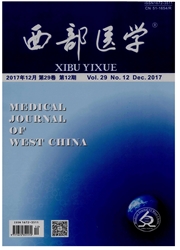

 中文摘要:
中文摘要:
目的 探讨信息支持对头颈部恶性肿瘤患者放射治疗后生存质量的影响.方法 选取2010年10月~2012年3月经放射治疗后的头颈部恶性肿瘤患者86例,经抽签随机分为常规纽和实验组各43例,常规组进行常规性医疗、锻炼和休息,实验组在常规治疗护理的同时再给予6个月的信息干预支持,内容包括网络信息支持、医护人员信息支持、家属信息支持和举办讲座等.对两组患者信息干预前后的各项功能指标和症状指标进行对比分析.结果 实验组患者接受信息支持干预后,其躯体功能、角色功能、情绪功能、认知功能和社会功能各维度得分均有明显提高(均p<0.01),总体生活质量有所改善(P<0.05).实验组在接受信息干预后的躯体功能、角色功能、情绪功能、认知功能和社会功能各维度得分较常规组均有提高(P<0.01).结论 本研究结果显示,信息支持可改善头颈部恶性肿瘤患者放疗后的生命质量,提示信息支持在提高头颈部恶性肿瘤患者放射治疗后的生存质量方面具有积极意义.
 英文摘要:
英文摘要:
Objective To investigate the information supported for head and neck malignant tumor patients after radiotherapy quality of life. Methods 86 hospitalized patients with head and neck malignant tumor patients after radiotherapy were divided into routine group and experimental group. The routine group was treated with routine medicine, exercise and rest. The experimental group was treated another 6 months information supporting intervention. The interInformation support; Head and neck malignant tumor; Radiation therapy; Quality of lifevention methods included network information support and medical personnel information support, family support and training workshops. The functional index and symptoms indicators were observed. Results The physical function, role function, emotional function, cognitive function, social function and the latitude scores of experimental group were obviously improved before and after the intervention (P〈0.01) and the overall quality of life improved (P〈0.05). The physical function, role function, emotional function, cognitive function, social function and the latitude scores of experimental group were higher than that of routine group. Conclusion Information support has a positive role in head and neck malignant tumor patients after radiotherapy on quality of life.
 同期刊论文项目
同期刊论文项目
 同项目期刊论文
同项目期刊论文
 期刊信息
期刊信息
